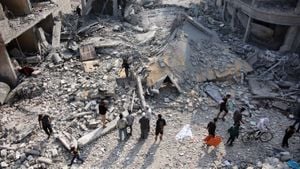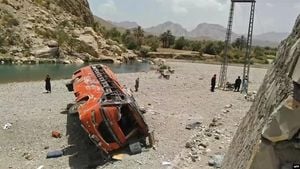FIFA's decision-making process is under intense scrutiny as Saudi Arabia's bid to host the 2034 World Cup faces criticism from human rights organizations. High-profile groups like Amnesty International and the Sport & Rights Alliance (SRA) are calling for the international football governing body to halt the bid until significant reforms protecting human rights are established. Their concerns stem from Saudi Arabia's record on human rights, particularly relating to discrimination and the treatment of migrant workers.
The backdrop to this situation is FIFA's earlier awarding of the 2030 World Cup to Morocco, Spain, and Portugal, leaving Saudi Arabia as the sole contender for the 2034 tournament. Amid revelations of deep-rooted human rights issues, Amnesty International has made it clear: approving Saudi Arabia's bid could compound existing human rights violations.
Steve Cockburn, Amnesty's head of labor rights and sport, voiced the dire consequences of awarding the World Cup to Saudi Arabia without adequate guarantees for reform. "There will be a real and predictable human cost... Fans will face discrimination, residents will be forcibly evicted, migrant workers will face exploitation, and many will die," he stated. Such stark warnings highlight the stakes for not just the players and fans, but also for thousands of migrant workers expected to build the necessary infrastructure.
The vision for the tournament includes the construction or renovation of about 15 stadiums and the creation of nearly 200,000 hotel rooms, which unsurprisingly relies heavily on a vast workforce, predominantly migrant labor. This labor force, much like what was seen during the controversial build-up to the Qatar 2022 World Cup, operates under potentially hazardous conditions exacerbated by the absence of labor protections. Concerns about worker safety and welfare are amplified by reports indicating thousands of migrant worker deaths during the 2022 World Cup preparations.
Specifically, Saudi Arabia's approach to labor rights brings to light its kafala system. This system binds migrant workers to their employers, creating vulnerable working conditions without fair wages or protections. Critics argue there has been no commitment from Saudi officials to reform this system or introduce minimum wage laws for non-citizen workers—issues already prominently discussed during Qatar's preparations.
Human rights organizations are also troubled by Saudi Arabia's approach to freedom of expression and its treatment of LGBTQ individuals. The kingdom maintains severe laws against homosexuality, which could lead to execution if proven. Although Hammad Albalawi, head of the World Cup bid unit, has publicly welcomed LGBTQ fans, the reality on the ground remains alarming. The growing nervousness about discrimination is palpable, especially as Saudi Arabia seeks to project itself as open and accommodating to all fan demographics.
Further complicity lays in the massive infrastructural shifts planned for the World Cup; these involve transforming vast areas for new construction, which may inevitably lead to forced evictions without adequate compensation for those displaced. Amnesty's Cockburn raised alarms about the broader societal impacts, stating the planned events could lead to widespread evictions, disproportionately affecting vulnerable populations.
FIFA is preparing to publish evaluation reports for the bids before its December 11 Congress, where the official vote on World Cup host selection will occur. FIFA insists on thorough processes similar to those undertaken for the 2023 Women’s World Cup and the upcoming 2026 World Cup, co-hosted by the U.S., Mexico, and Canada. Yet, with Saudi Arabia as the only bidder, observers view the vote as potentially lacking genuine competition.
The questions surrounding human rights remain central to the discussions. Beyond labor rights, the overall human rights strategy Saudi Arabia offers lacks transparency and credibility. The bid’s proposal fails to address significant issues such as the repression of free speech and the rights of women. Campaigners see it as tantamount to continuing past oppressive measures hidden beneath the guise of modernization and reform.
The international community, particularly human rights defenders, urges FIFA to take these concerns seriously before confirming the host for the 2034 World Cup. Should FIFA ignore these human rights issues, the sporting body risks being viewed as complicit, prioritizing profit and prestige over the ethical standards it claims to uphold.
With the clock ticking down to the pivotal December vote, the question looms large: Will FIFA stand firm against potential human rights abuses, or will it falter under financial pressure and political maneuvering? The outcome of this decision could set significant precedents for future sporting events, signaling whether human rights truly hold weight against the glamor of football's biggest stage.



